Analyzing Attribution Theory's Role in Performance Appraisal (MGMT 2)
VerifiedAdded on 2022/10/13
|9
|1685
|26
Report
AI Summary
This report examines the influence of attribution theory on the performance appraisal process within organizations. It analyzes the theory's positive and negative impacts on both employees and the organization, highlighting how attributions can affect employee motivation and managerial effectiveness. The report identifies various biases within the attribution theory, such as self-serving bias and actor-observer bias, and suggests ways supervisors can manage these biases through effective decision-making and rational judgments. The conclusion emphasizes the importance of understanding attribution theory to improve performance appraisal and overall organizational effectiveness, recommending rational decision-making approaches to mitigate biases. The report references key studies that support its findings, providing a comprehensive overview of the topic.
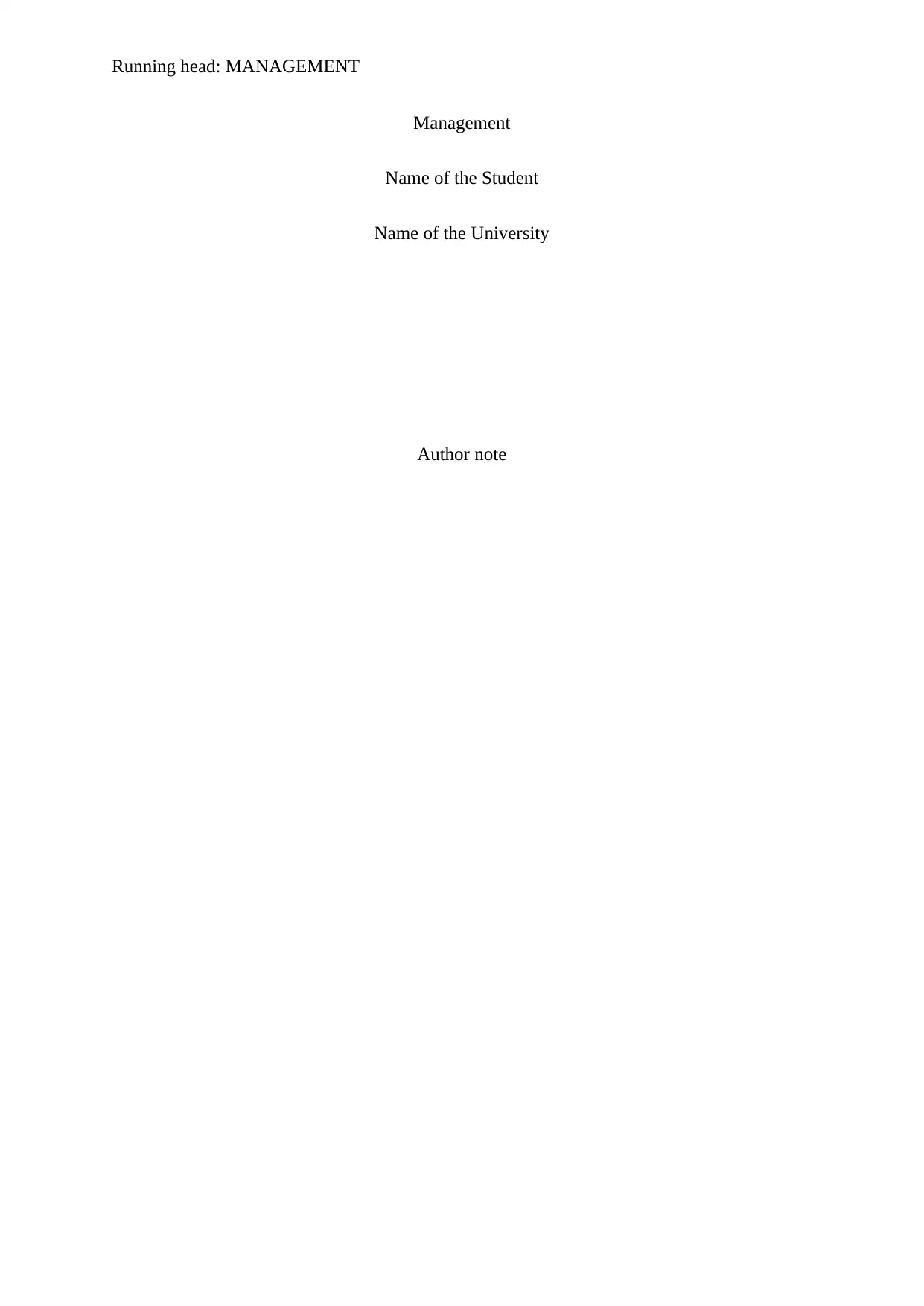
Running head: MANAGEMENT
Management
Name of the Student
Name of the University
Author note
Management
Name of the Student
Name of the University
Author note
Paraphrase This Document
Need a fresh take? Get an instant paraphrase of this document with our AI Paraphraser
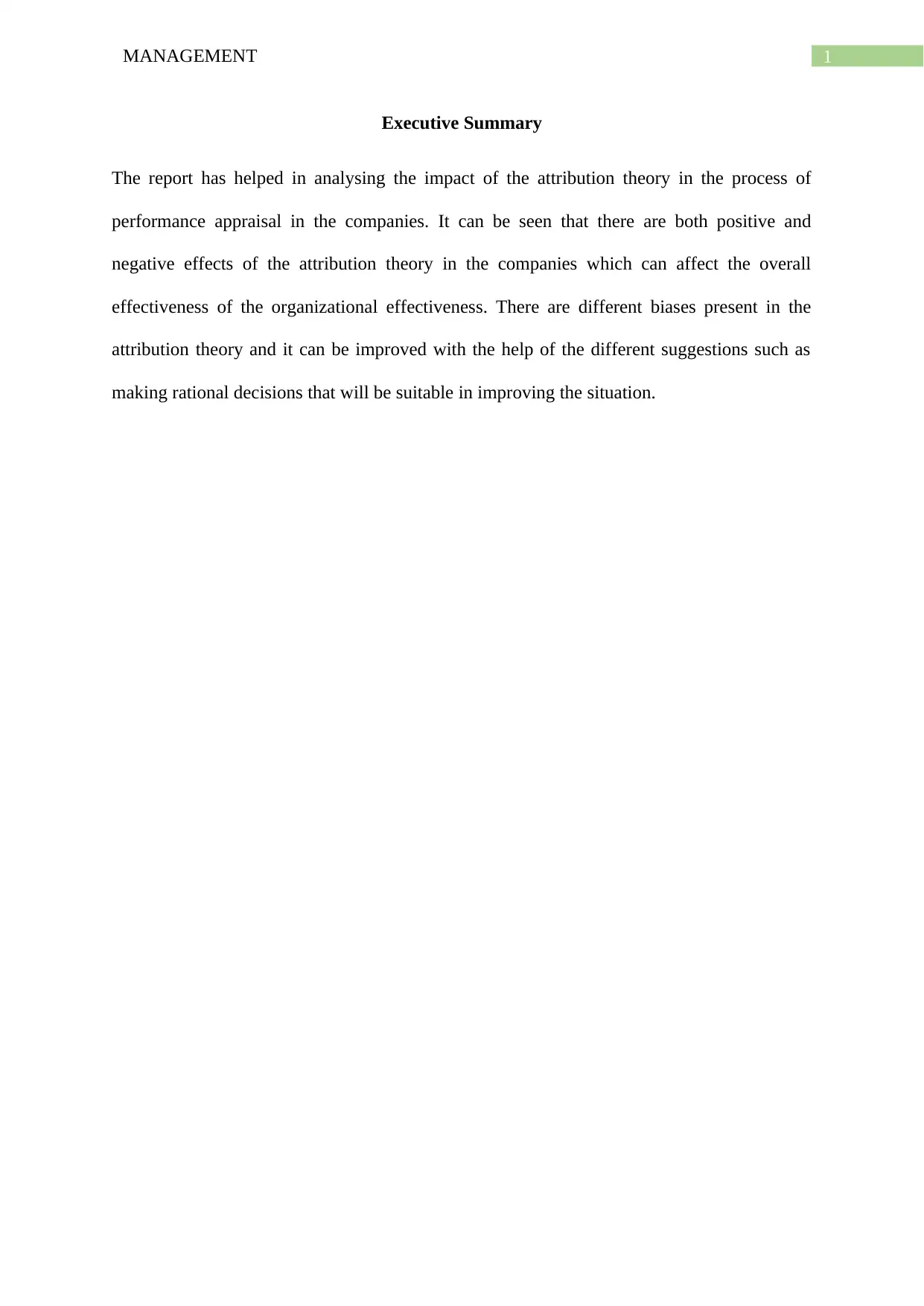
1MANAGEMENT
Executive Summary
The report has helped in analysing the impact of the attribution theory in the process of
performance appraisal in the companies. It can be seen that there are both positive and
negative effects of the attribution theory in the companies which can affect the overall
effectiveness of the organizational effectiveness. There are different biases present in the
attribution theory and it can be improved with the help of the different suggestions such as
making rational decisions that will be suitable in improving the situation.
Executive Summary
The report has helped in analysing the impact of the attribution theory in the process of
performance appraisal in the companies. It can be seen that there are both positive and
negative effects of the attribution theory in the companies which can affect the overall
effectiveness of the organizational effectiveness. There are different biases present in the
attribution theory and it can be improved with the help of the different suggestions such as
making rational decisions that will be suitable in improving the situation.
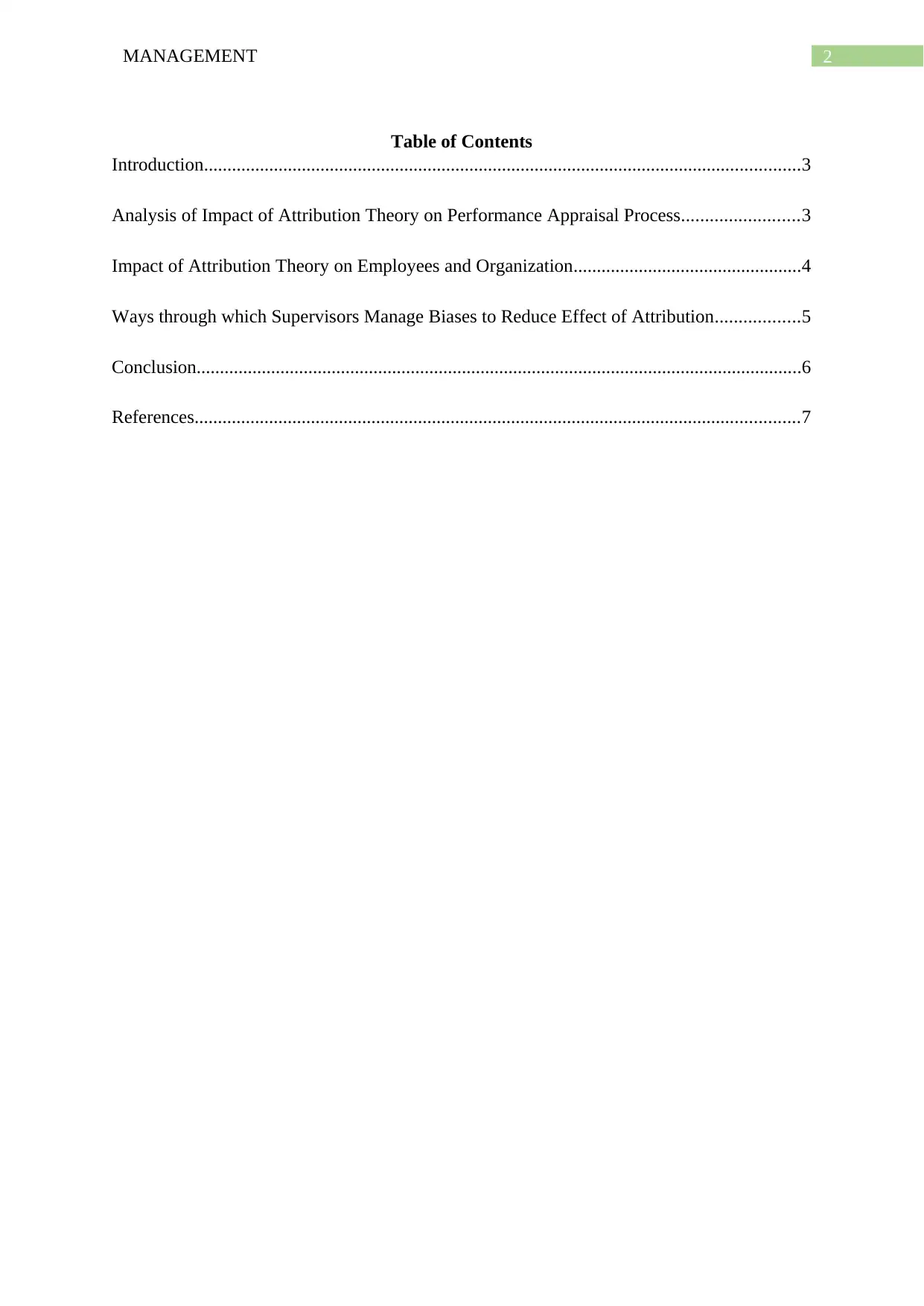
2MANAGEMENT
Table of Contents
Introduction................................................................................................................................3
Analysis of Impact of Attribution Theory on Performance Appraisal Process.........................3
Impact of Attribution Theory on Employees and Organization.................................................4
Ways through which Supervisors Manage Biases to Reduce Effect of Attribution..................5
Conclusion..................................................................................................................................6
References..................................................................................................................................7
Table of Contents
Introduction................................................................................................................................3
Analysis of Impact of Attribution Theory on Performance Appraisal Process.........................3
Impact of Attribution Theory on Employees and Organization.................................................4
Ways through which Supervisors Manage Biases to Reduce Effect of Attribution..................5
Conclusion..................................................................................................................................6
References..................................................................................................................................7
⊘ This is a preview!⊘
Do you want full access?
Subscribe today to unlock all pages.

Trusted by 1+ million students worldwide
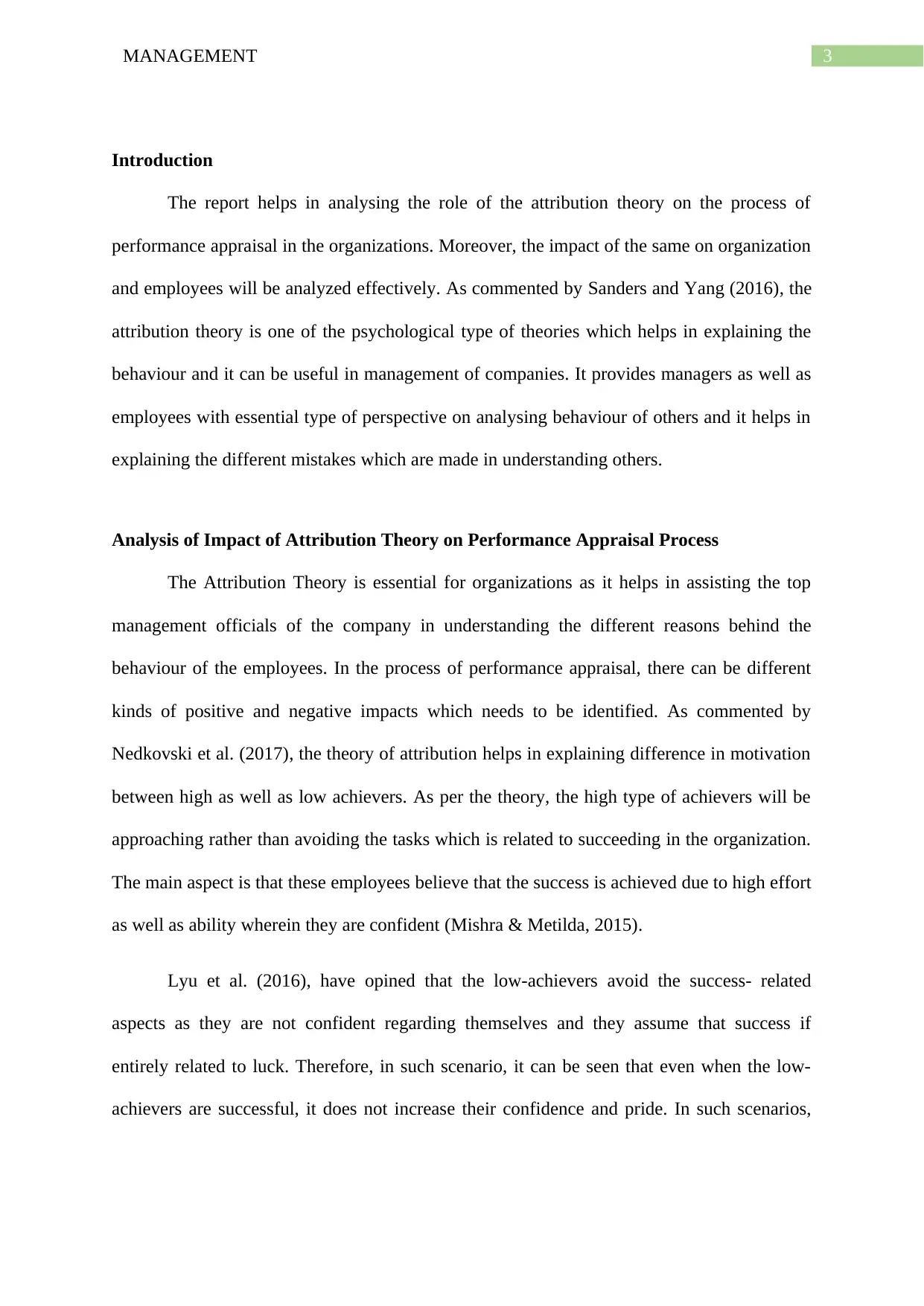
3MANAGEMENT
Introduction
The report helps in analysing the role of the attribution theory on the process of
performance appraisal in the organizations. Moreover, the impact of the same on organization
and employees will be analyzed effectively. As commented by Sanders and Yang (2016), the
attribution theory is one of the psychological type of theories which helps in explaining the
behaviour and it can be useful in management of companies. It provides managers as well as
employees with essential type of perspective on analysing behaviour of others and it helps in
explaining the different mistakes which are made in understanding others.
Analysis of Impact of Attribution Theory on Performance Appraisal Process
The Attribution Theory is essential for organizations as it helps in assisting the top
management officials of the company in understanding the different reasons behind the
behaviour of the employees. In the process of performance appraisal, there can be different
kinds of positive and negative impacts which needs to be identified. As commented by
Nedkovski et al. (2017), the theory of attribution helps in explaining difference in motivation
between high as well as low achievers. As per the theory, the high type of achievers will be
approaching rather than avoiding the tasks which is related to succeeding in the organization.
The main aspect is that these employees believe that the success is achieved due to high effort
as well as ability wherein they are confident (Mishra & Metilda, 2015).
Lyu et al. (2016), have opined that the low-achievers avoid the success- related
aspects as they are not confident regarding themselves and they assume that success if
entirely related to luck. Therefore, in such scenario, it can be seen that even when the low-
achievers are successful, it does not increase their confidence and pride. In such scenarios,
Introduction
The report helps in analysing the role of the attribution theory on the process of
performance appraisal in the organizations. Moreover, the impact of the same on organization
and employees will be analyzed effectively. As commented by Sanders and Yang (2016), the
attribution theory is one of the psychological type of theories which helps in explaining the
behaviour and it can be useful in management of companies. It provides managers as well as
employees with essential type of perspective on analysing behaviour of others and it helps in
explaining the different mistakes which are made in understanding others.
Analysis of Impact of Attribution Theory on Performance Appraisal Process
The Attribution Theory is essential for organizations as it helps in assisting the top
management officials of the company in understanding the different reasons behind the
behaviour of the employees. In the process of performance appraisal, there can be different
kinds of positive and negative impacts which needs to be identified. As commented by
Nedkovski et al. (2017), the theory of attribution helps in explaining difference in motivation
between high as well as low achievers. As per the theory, the high type of achievers will be
approaching rather than avoiding the tasks which is related to succeeding in the organization.
The main aspect is that these employees believe that the success is achieved due to high effort
as well as ability wherein they are confident (Mishra & Metilda, 2015).
Lyu et al. (2016), have opined that the low-achievers avoid the success- related
aspects as they are not confident regarding themselves and they assume that success if
entirely related to luck. Therefore, in such scenario, it can be seen that even when the low-
achievers are successful, it does not increase their confidence and pride. In such scenarios,
Paraphrase This Document
Need a fresh take? Get an instant paraphrase of this document with our AI Paraphraser
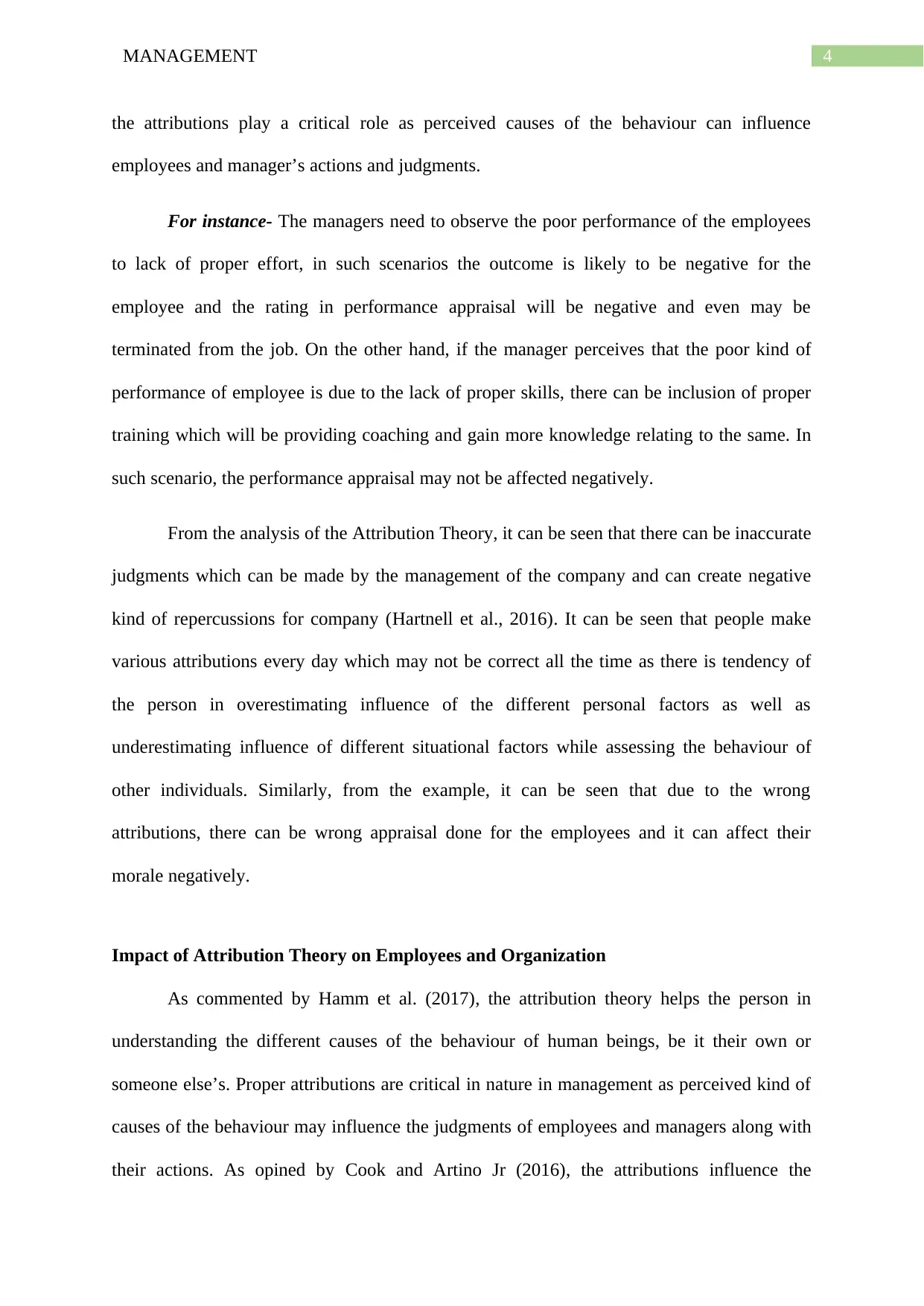
4MANAGEMENT
the attributions play a critical role as perceived causes of the behaviour can influence
employees and manager’s actions and judgments.
For instance- The managers need to observe the poor performance of the employees
to lack of proper effort, in such scenarios the outcome is likely to be negative for the
employee and the rating in performance appraisal will be negative and even may be
terminated from the job. On the other hand, if the manager perceives that the poor kind of
performance of employee is due to the lack of proper skills, there can be inclusion of proper
training which will be providing coaching and gain more knowledge relating to the same. In
such scenario, the performance appraisal may not be affected negatively.
From the analysis of the Attribution Theory, it can be seen that there can be inaccurate
judgments which can be made by the management of the company and can create negative
kind of repercussions for company (Hartnell et al., 2016). It can be seen that people make
various attributions every day which may not be correct all the time as there is tendency of
the person in overestimating influence of the different personal factors as well as
underestimating influence of different situational factors while assessing the behaviour of
other individuals. Similarly, from the example, it can be seen that due to the wrong
attributions, there can be wrong appraisal done for the employees and it can affect their
morale negatively.
Impact of Attribution Theory on Employees and Organization
As commented by Hamm et al. (2017), the attribution theory helps the person in
understanding the different causes of the behaviour of human beings, be it their own or
someone else’s. Proper attributions are critical in nature in management as perceived kind of
causes of the behaviour may influence the judgments of employees and managers along with
their actions. As opined by Cook and Artino Jr (2016), the attributions influence the
the attributions play a critical role as perceived causes of the behaviour can influence
employees and manager’s actions and judgments.
For instance- The managers need to observe the poor performance of the employees
to lack of proper effort, in such scenarios the outcome is likely to be negative for the
employee and the rating in performance appraisal will be negative and even may be
terminated from the job. On the other hand, if the manager perceives that the poor kind of
performance of employee is due to the lack of proper skills, there can be inclusion of proper
training which will be providing coaching and gain more knowledge relating to the same. In
such scenario, the performance appraisal may not be affected negatively.
From the analysis of the Attribution Theory, it can be seen that there can be inaccurate
judgments which can be made by the management of the company and can create negative
kind of repercussions for company (Hartnell et al., 2016). It can be seen that people make
various attributions every day which may not be correct all the time as there is tendency of
the person in overestimating influence of the different personal factors as well as
underestimating influence of different situational factors while assessing the behaviour of
other individuals. Similarly, from the example, it can be seen that due to the wrong
attributions, there can be wrong appraisal done for the employees and it can affect their
morale negatively.
Impact of Attribution Theory on Employees and Organization
As commented by Hamm et al. (2017), the attribution theory helps the person in
understanding the different causes of the behaviour of human beings, be it their own or
someone else’s. Proper attributions are critical in nature in management as perceived kind of
causes of the behaviour may influence the judgments of employees and managers along with
their actions. As opined by Cook and Artino Jr (2016), the attributions influence the
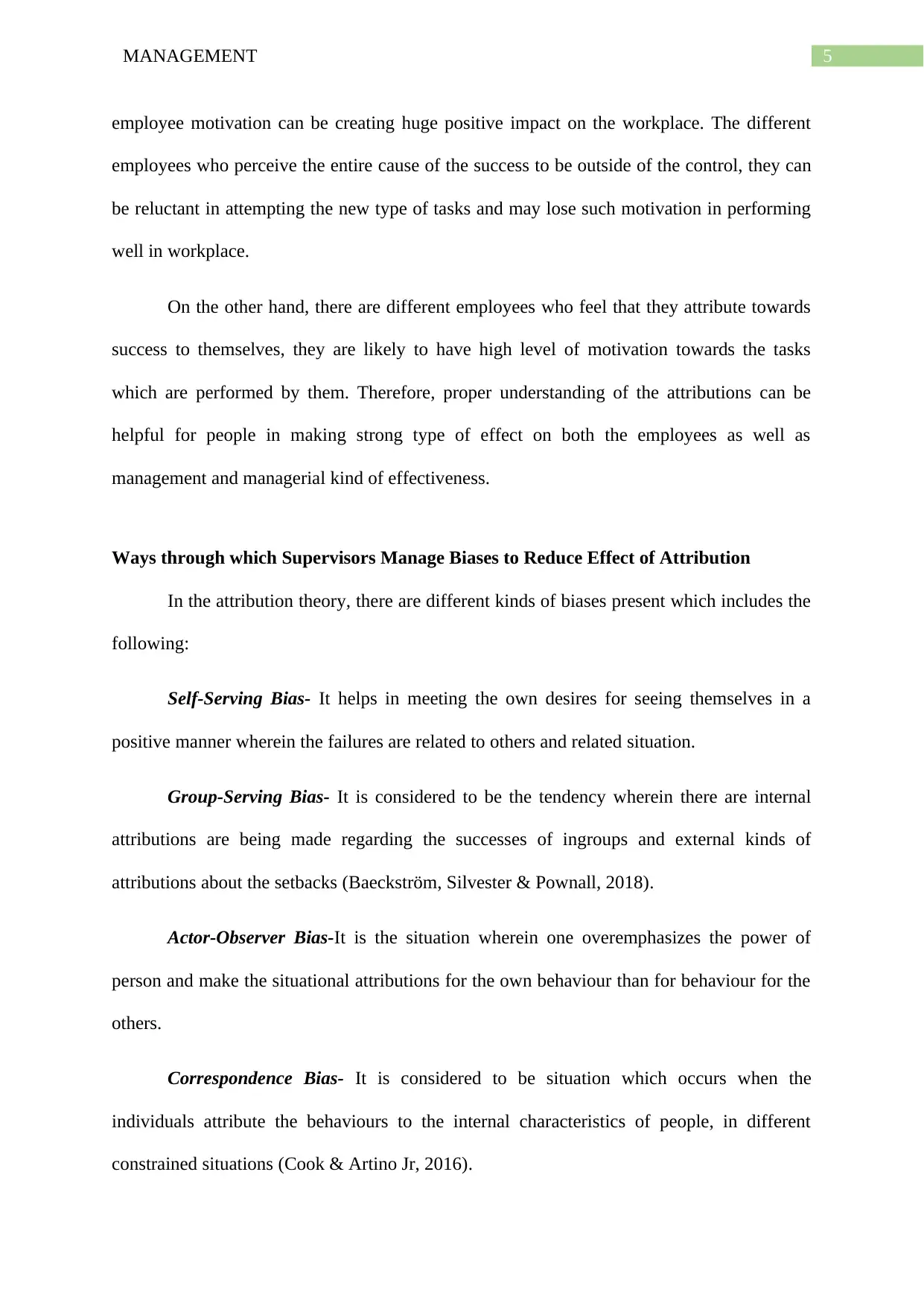
5MANAGEMENT
employee motivation can be creating huge positive impact on the workplace. The different
employees who perceive the entire cause of the success to be outside of the control, they can
be reluctant in attempting the new type of tasks and may lose such motivation in performing
well in workplace.
On the other hand, there are different employees who feel that they attribute towards
success to themselves, they are likely to have high level of motivation towards the tasks
which are performed by them. Therefore, proper understanding of the attributions can be
helpful for people in making strong type of effect on both the employees as well as
management and managerial kind of effectiveness.
Ways through which Supervisors Manage Biases to Reduce Effect of Attribution
In the attribution theory, there are different kinds of biases present which includes the
following:
Self-Serving Bias- It helps in meeting the own desires for seeing themselves in a
positive manner wherein the failures are related to others and related situation.
Group-Serving Bias- It is considered to be the tendency wherein there are internal
attributions are being made regarding the successes of ingroups and external kinds of
attributions about the setbacks (Baeckström, Silvester & Pownall, 2018).
Actor-Observer Bias-It is the situation wherein one overemphasizes the power of
person and make the situational attributions for the own behaviour than for behaviour for the
others.
Correspondence Bias- It is considered to be situation which occurs when the
individuals attribute the behaviours to the internal characteristics of people, in different
constrained situations (Cook & Artino Jr, 2016).
employee motivation can be creating huge positive impact on the workplace. The different
employees who perceive the entire cause of the success to be outside of the control, they can
be reluctant in attempting the new type of tasks and may lose such motivation in performing
well in workplace.
On the other hand, there are different employees who feel that they attribute towards
success to themselves, they are likely to have high level of motivation towards the tasks
which are performed by them. Therefore, proper understanding of the attributions can be
helpful for people in making strong type of effect on both the employees as well as
management and managerial kind of effectiveness.
Ways through which Supervisors Manage Biases to Reduce Effect of Attribution
In the attribution theory, there are different kinds of biases present which includes the
following:
Self-Serving Bias- It helps in meeting the own desires for seeing themselves in a
positive manner wherein the failures are related to others and related situation.
Group-Serving Bias- It is considered to be the tendency wherein there are internal
attributions are being made regarding the successes of ingroups and external kinds of
attributions about the setbacks (Baeckström, Silvester & Pownall, 2018).
Actor-Observer Bias-It is the situation wherein one overemphasizes the power of
person and make the situational attributions for the own behaviour than for behaviour for the
others.
Correspondence Bias- It is considered to be situation which occurs when the
individuals attribute the behaviours to the internal characteristics of people, in different
constrained situations (Cook & Artino Jr, 2016).
⊘ This is a preview!⊘
Do you want full access?
Subscribe today to unlock all pages.

Trusted by 1+ million students worldwide
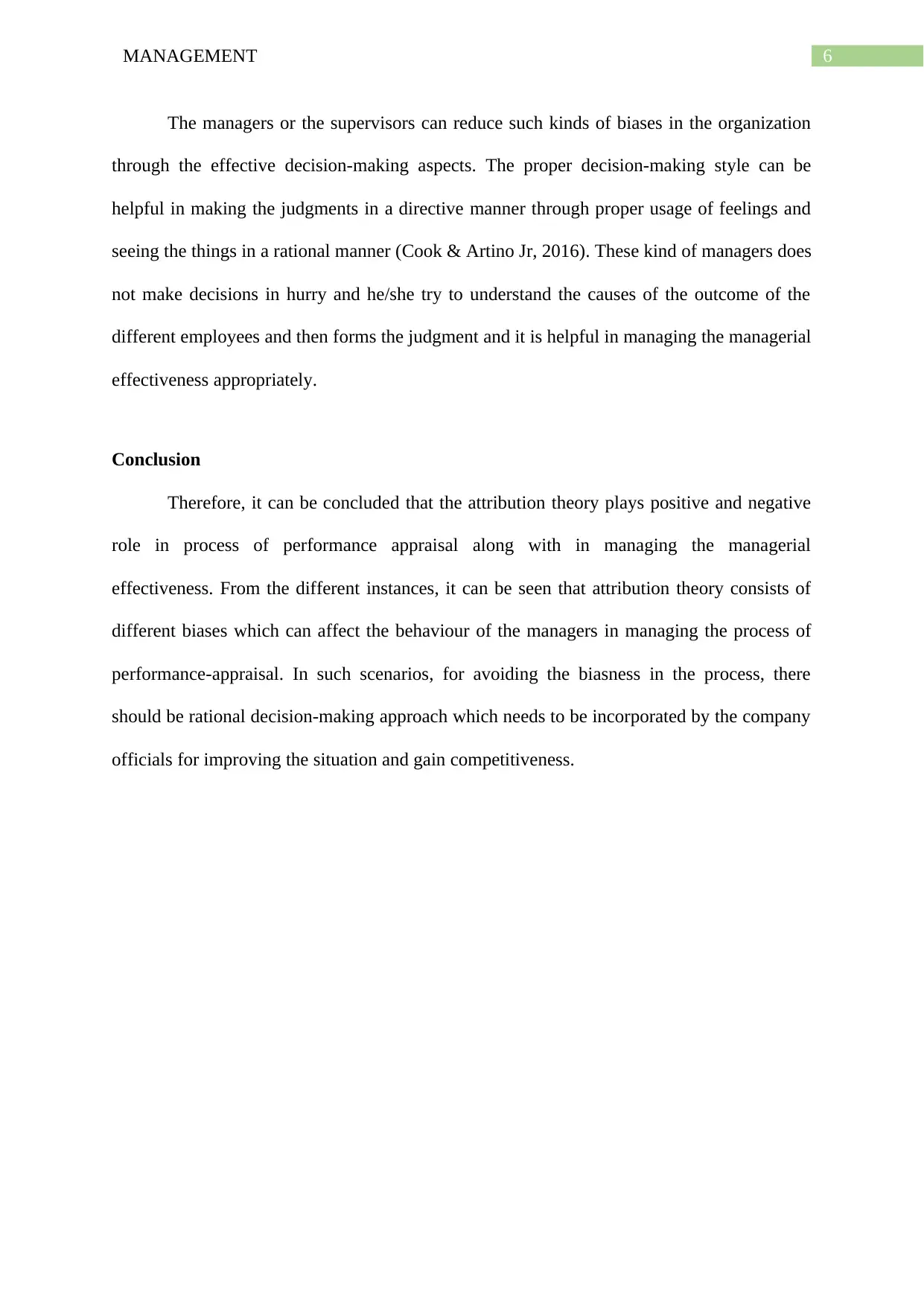
6MANAGEMENT
The managers or the supervisors can reduce such kinds of biases in the organization
through the effective decision-making aspects. The proper decision-making style can be
helpful in making the judgments in a directive manner through proper usage of feelings and
seeing the things in a rational manner (Cook & Artino Jr, 2016). These kind of managers does
not make decisions in hurry and he/she try to understand the causes of the outcome of the
different employees and then forms the judgment and it is helpful in managing the managerial
effectiveness appropriately.
Conclusion
Therefore, it can be concluded that the attribution theory plays positive and negative
role in process of performance appraisal along with in managing the managerial
effectiveness. From the different instances, it can be seen that attribution theory consists of
different biases which can affect the behaviour of the managers in managing the process of
performance-appraisal. In such scenarios, for avoiding the biasness in the process, there
should be rational decision-making approach which needs to be incorporated by the company
officials for improving the situation and gain competitiveness.
The managers or the supervisors can reduce such kinds of biases in the organization
through the effective decision-making aspects. The proper decision-making style can be
helpful in making the judgments in a directive manner through proper usage of feelings and
seeing the things in a rational manner (Cook & Artino Jr, 2016). These kind of managers does
not make decisions in hurry and he/she try to understand the causes of the outcome of the
different employees and then forms the judgment and it is helpful in managing the managerial
effectiveness appropriately.
Conclusion
Therefore, it can be concluded that the attribution theory plays positive and negative
role in process of performance appraisal along with in managing the managerial
effectiveness. From the different instances, it can be seen that attribution theory consists of
different biases which can affect the behaviour of the managers in managing the process of
performance-appraisal. In such scenarios, for avoiding the biasness in the process, there
should be rational decision-making approach which needs to be incorporated by the company
officials for improving the situation and gain competitiveness.
Paraphrase This Document
Need a fresh take? Get an instant paraphrase of this document with our AI Paraphraser
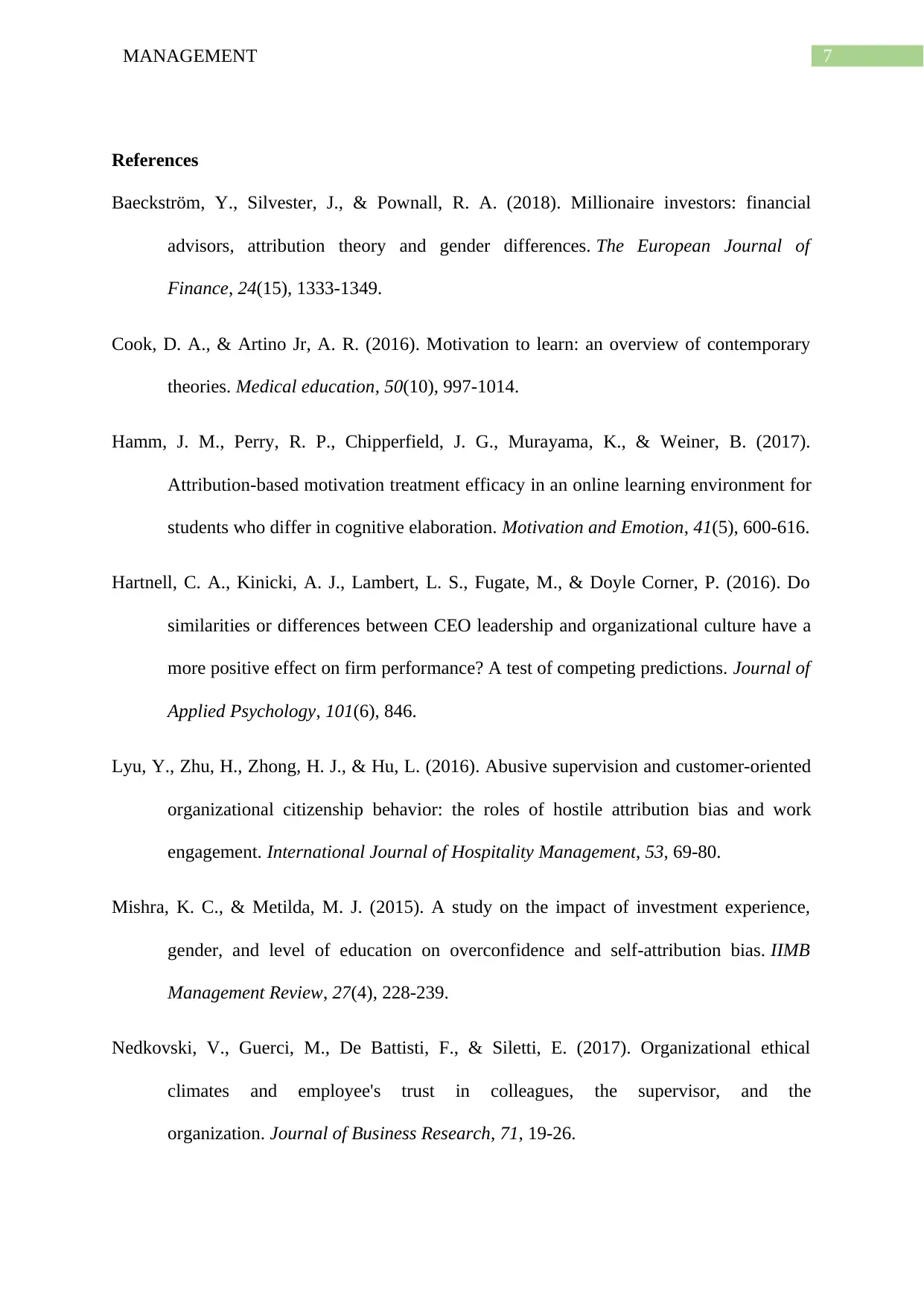
7MANAGEMENT
References
Baeckström, Y., Silvester, J., & Pownall, R. A. (2018). Millionaire investors: financial
advisors, attribution theory and gender differences. The European Journal of
Finance, 24(15), 1333-1349.
Cook, D. A., & Artino Jr, A. R. (2016). Motivation to learn: an overview of contemporary
theories. Medical education, 50(10), 997-1014.
Hamm, J. M., Perry, R. P., Chipperfield, J. G., Murayama, K., & Weiner, B. (2017).
Attribution-based motivation treatment efficacy in an online learning environment for
students who differ in cognitive elaboration. Motivation and Emotion, 41(5), 600-616.
Hartnell, C. A., Kinicki, A. J., Lambert, L. S., Fugate, M., & Doyle Corner, P. (2016). Do
similarities or differences between CEO leadership and organizational culture have a
more positive effect on firm performance? A test of competing predictions. Journal of
Applied Psychology, 101(6), 846.
Lyu, Y., Zhu, H., Zhong, H. J., & Hu, L. (2016). Abusive supervision and customer-oriented
organizational citizenship behavior: the roles of hostile attribution bias and work
engagement. International Journal of Hospitality Management, 53, 69-80.
Mishra, K. C., & Metilda, M. J. (2015). A study on the impact of investment experience,
gender, and level of education on overconfidence and self-attribution bias. IIMB
Management Review, 27(4), 228-239.
Nedkovski, V., Guerci, M., De Battisti, F., & Siletti, E. (2017). Organizational ethical
climates and employee's trust in colleagues, the supervisor, and the
organization. Journal of Business Research, 71, 19-26.
References
Baeckström, Y., Silvester, J., & Pownall, R. A. (2018). Millionaire investors: financial
advisors, attribution theory and gender differences. The European Journal of
Finance, 24(15), 1333-1349.
Cook, D. A., & Artino Jr, A. R. (2016). Motivation to learn: an overview of contemporary
theories. Medical education, 50(10), 997-1014.
Hamm, J. M., Perry, R. P., Chipperfield, J. G., Murayama, K., & Weiner, B. (2017).
Attribution-based motivation treatment efficacy in an online learning environment for
students who differ in cognitive elaboration. Motivation and Emotion, 41(5), 600-616.
Hartnell, C. A., Kinicki, A. J., Lambert, L. S., Fugate, M., & Doyle Corner, P. (2016). Do
similarities or differences between CEO leadership and organizational culture have a
more positive effect on firm performance? A test of competing predictions. Journal of
Applied Psychology, 101(6), 846.
Lyu, Y., Zhu, H., Zhong, H. J., & Hu, L. (2016). Abusive supervision and customer-oriented
organizational citizenship behavior: the roles of hostile attribution bias and work
engagement. International Journal of Hospitality Management, 53, 69-80.
Mishra, K. C., & Metilda, M. J. (2015). A study on the impact of investment experience,
gender, and level of education on overconfidence and self-attribution bias. IIMB
Management Review, 27(4), 228-239.
Nedkovski, V., Guerci, M., De Battisti, F., & Siletti, E. (2017). Organizational ethical
climates and employee's trust in colleagues, the supervisor, and the
organization. Journal of Business Research, 71, 19-26.

8MANAGEMENT
Sanders, K., & Yang, H. (2016). The HRM process approach: The influence of employees’
attribution to explain the HRM‐performance relationship. Human Resource
Management, 55(2), 201-217.
Sanders, K., & Yang, H. (2016). The HRM process approach: The influence of employees’
attribution to explain the HRM‐performance relationship. Human Resource
Management, 55(2), 201-217.
⊘ This is a preview!⊘
Do you want full access?
Subscribe today to unlock all pages.

Trusted by 1+ million students worldwide
1 out of 9
Related Documents
Your All-in-One AI-Powered Toolkit for Academic Success.
+13062052269
info@desklib.com
Available 24*7 on WhatsApp / Email
![[object Object]](/_next/static/media/star-bottom.7253800d.svg)
Unlock your academic potential
Copyright © 2020–2026 A2Z Services. All Rights Reserved. Developed and managed by ZUCOL.





